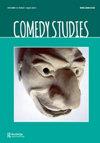Special editorial
Q1 Arts and Humanities
引用次数: 0
Abstract
The global COVID-19 pandemic has caused extraordinary effects on all our lives, right across the globe. The need to socially distance and the abrupt switch to online and digital means of communication have irrevocably changed the way that we interact for the purposes of creating community, for business and educational purposes and for the production and consumption of culture and art. Comedy, as a form of entertainment, has been hit particularly hard. Effective live comedy relies on performer and audience interplay within a complicit community; the audible sound of laughter as a reciprocal mechanism of assessing the interaction; the appearance of spontaneity; and expertise in the use of timing and other craft skills that are reliant on the here-and-now engagement. Each of these elements are especially difficult to replicate or reproduce through digital platforms. How, then, have comedians around the world managed this dramatic shift in the delivery and reception of their creative work? Comedy Studies has asked five international friends and correspondents to provide a pen-portrait of the situation that comedians in their respective areas have faced in the time of the global pandemic. Each give their take on how practitioners have responded to the exigencies caused by the crisis. Ellie Tomsett reports on the UK situation; Eric Shouse on North America; Ignatius Chukwumah on Africa; Anastasiya Fiadotava on East European; and Cale Bain on Australia and New Zealand. We also include a special article on this topic in Humour and Coronavirus: Coping with the Pandemic in Ghana by Susanna Adjei Arthur. We are hugely grateful for all their perspectives which together, will hopefully, give a round-up of Comedy in the time of Covid, while illustrating Marshall McLuhan’s prophetic observation in 1964 about ‘the ability of the artist to sidestep the bully blow of new technology of any age, and to parry such violence with full awareness’ (71). We are also happy to be able to provide our usual eclectic mix and range of articles on more general business of Comedy Studies. These cover perspectives on darkly prophetic foreshadowing in the US Sitcom Cybill; gender struggle in The Cambridge Footlights; The ‘comic triple’ mechanism: The Book of Mormon; Morecambe and Wise; Schitt’s Creek and stand-up comedy and incarceration.特殊的编辑
全球新冠肺炎大流行对全球所有人的生活造成了非同寻常的影响。社交距离的需要,以及突然转向在线和数字通信手段,已经不可逆转地改变了我们为创建社区、商业和教育目的以及文化和艺术的生产和消费而互动的方式。喜剧作为一种娱乐形式,受到的打击尤其严重。有效的现场喜剧依赖于表演者和观众在同谋群体中的互动;作为相互作用评估机制的可听见的笑声;自发性的出现;以及在使用时机和其他工艺技能方面的专业知识,这些技能依赖于此时此地的参与。这些元素中的每一个都特别难以通过数字平台进行复制或复制。那么,世界各地的喜剧演员是如何在创作作品的交付和接收方面实现这一戏剧性转变的呢?《喜剧研究》邀请了五位国际朋友和记者,用钢笔描绘了各自地区的喜剧演员在全球疫情期间所面临的情况。每个人都对从业者如何应对危机造成的紧急情况发表了自己的看法。Ellie Tomsett报道英国局势;Eric Shouse谈北美;Ignatius Chukwumah谈非洲;Anastasiya Fiadotava谈东欧;Cale Bain谈澳大利亚和新西兰。我们还在Susanna Adjei Arthur的《幽默与冠状病毒:应对加纳的流行病》中收录了一篇关于这一主题的特别文章。我们非常感谢他们所有的视角,希望这些视角能为新冠肺炎时代的喜剧提供一个综述,同时展示马歇尔·麦克卢汉在1964年关于“艺术家有能力避开任何时代新技术的欺凌,并以充分的意识抵御这种暴力”的预言性观察(71)。我们也很高兴能够提供我们通常不拘一格的混合和范围的文章,关于喜剧研究的一般业务。这些涵盖了对美国Sitcom Cybill中黑暗预言性伏笔的看法;《剑桥脚灯》中的性别斗争;“漫画三重”机制:《摩门教》;莫克姆和怀斯;Schitt‘s Creek和单口喜剧以及监禁。
本文章由计算机程序翻译,如有差异,请以英文原文为准。
求助全文
约1分钟内获得全文
求助全文
来源期刊

Comedy Studies
Arts and Humanities-Literature and Literary Theory
CiteScore
0.60
自引率
0.00%
发文量
26
 求助内容:
求助内容: 应助结果提醒方式:
应助结果提醒方式:


